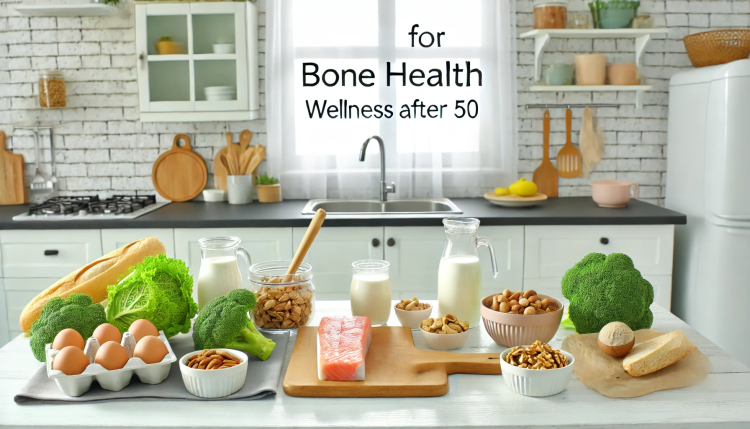Eating to Prevent Osteoporosis: Nutritional Strategies for Bone Health After 50

As we age, maintaining strong and healthy bones becomes increasingly important. Osteoporosis, a condition characterized by weak and brittle bones, affects millions of people, particularly those over the age of 50. It is especially common among postmenopausal women, whose bone density decreases due to hormonal changes. However, osteoporosis is not an inevitable part of aging. By making smart dietary choices, it is possible to strengthen bones and reduce the risk of fractures. This guide will explore the nutritional strategies that can help prevent osteoporosis and promote optimal bone health after 50.
Understanding Osteoporosis and Bone Health
Osteoporosis is often called a "silent disease" because it progresses without noticeable symptoms until a fracture occurs. Bones are living tissues that are constantly being broken down and rebuilt, a process known as bone remodeling. As we age, the rate of bone breakdown can outpace the rate of bone formation, leading to a gradual loss of bone density. When bones lose density, they become more fragile and susceptible to fractures, particularly in the hip, spine, and wrist.
Several factors contribute to bone health, including genetics, physical activity, and nutrition. While we cannot change our genetic makeup, we can certainly influence our bone health through lifestyle choices. Diet plays a critical role in providing the essential nutrients that support bone formation and maintenance. By focusing on bone-friendly foods and nutrients, it is possible to improve bone strength and reduce the risk of osteoporosis.
The Role of Calcium in Bone Health
Calcium is the most well-known nutrient for bone health, and for good reason. About 99% of the calcium in the body is stored in the bones and teeth, where it provides structural support. Adequate calcium intake is essential for maintaining bone density and preventing osteoporosis. Unfortunately, many people do not consume enough calcium, particularly as they age.
The recommended daily intake of calcium for adults over 50 is 1,200 milligrams. This can be achieved through a combination of dietary sources and supplements if necessary. Dairy products, such as milk, yogurt, and cheese, are some of the best sources of calcium. For those who are lactose intolerant or prefer not to consume dairy, there are plenty of non-dairy options available. Leafy green vegetables like kale, collard greens, and bok choy are excellent sources of calcium, as are fortified plant-based milks, almonds, and tofu.
It is important to spread calcium intake throughout the day, as the body can only absorb a limited amount at a time. Including calcium-rich foods in each meal can help ensure that you are meeting your daily needs. Additionally, pairing calcium-rich foods with sources of Vitamin D can enhance calcium absorption, which is crucial for maintaining strong bones.

Vitamin D: The Sunshine Vitamin
Vitamin D plays a vital role in bone health by aiding calcium absorption. Without sufficient Vitamin D, the body cannot effectively absorb calcium, regardless of how much calcium is consumed. Vitamin D is unique in that it can be synthesized by the body when the skin is exposed to sunlight. However, as we age, the skin becomes less efficient at producing Vitamin D, and many people do not get enough sun exposure, particularly during the winter months.
The recommended daily intake of Vitamin D for adults over 50 is 800 to 1,000 international units (IU). Fatty fish such as salmon, mackerel, and sardines are excellent dietary sources of Vitamin D. Egg yolks and fortified foods, such as milk and orange juice, also provide some Vitamin D. For those who have difficulty getting enough Vitamin D through diet and sun exposure, supplements may be necessary to meet the recommended intake.
Spending time outdoors and enjoying activities like walking or gardening can help boost Vitamin D levels. Even just 10 to 30 minutes of sun exposure several times a week can make a difference. However, it is important to balance sun exposure with skin protection to reduce the risk of skin cancer. If sun exposure is limited, a Vitamin D supplement can be an effective way to support bone health.
The Importance of Magnesium and Vitamin K
Magnesium and Vitamin K are two additional nutrients that play important roles in bone health. Magnesium is involved in the conversion of Vitamin D into its active form, which helps regulate calcium levels in the body. A deficiency in magnesium can impair bone mineralization and contribute to bone loss. Foods rich in magnesium include nuts, seeds, whole grains, and leafy green vegetables. Including these foods in your diet can help ensure that you are getting enough magnesium to support bone health.
Vitamin K is another nutrient that is essential for bone health, as it helps regulate calcium and supports bone mineralization. Vitamin K is found in leafy green vegetables like kale, spinach, and broccoli, as well as in fermented foods like natto. Including a variety of Vitamin K-rich foods in your diet can help promote bone health and reduce the risk of osteoporosis. It is particularly important for postmenopausal women, who are at increased risk of bone loss, to ensure that they are getting enough Vitamin K in their diet.
Protein: Building Blocks for Strong Bones
Protein is often associated with muscle health, but it is also crucial for maintaining strong bones. Bones are made up of a protein matrix that provides the framework for bone mineralization. Adequate protein intake is essential for bone repair and maintenance, particularly as we age. However, there is a common misconception that a high-protein diet can lead to calcium loss and weaken bones. In reality, research has shown that adequate protein intake is beneficial for bone health, especially when combined with sufficient calcium intake.
Good sources of protein include lean meats, poultry, fish, eggs, dairy products, legumes, and nuts. It is important to include a source of protein in each meal to support bone health and overall well-being. For those who follow a plant-based diet, legumes, tofu, tempeh, and quinoa are excellent sources of protein that can help meet daily needs. By incorporating a variety of protein-rich foods into your diet, you can help maintain the strength and integrity of your bones.

The Role of Fruits and Vegetables in Bone Health
Fruits and vegetables are rich in vitamins, minerals, and antioxidants that support bone health. In particular, they provide important nutrients like potassium, Vitamin C, and Vitamin K, which help maintain bone density and reduce the risk of fractures. Potassium helps neutralize acids in the body that can leach calcium from the bones, while Vitamin C is essential for collagen formation, a protein that provides structure to bones.
Colorful fruits and vegetables, such as berries, oranges, bell peppers, and leafy greens, are excellent choices for promoting bone health. These foods are also anti-inflammatory, which is important because chronic inflammation can contribute to bone loss. Aim to include a variety of fruits and vegetables in your diet each day to ensure that you are getting a wide range of bone-supporting nutrients. Smoothies, salads, and stir-fries are great ways to incorporate more fruits and vegetables into your meals.
Limiting Bone-Damaging Foods
While focusing on bone-friendly foods is important, it is also crucial to limit the consumption of foods and beverages that can have a negative impact on bone health. Excessive salt intake can lead to increased calcium excretion in the urine, which can weaken bones over time. To reduce sodium intake, avoid processed foods, canned soups, and salty snacks, and opt for fresh, whole foods instead. Cooking at home allows you to control the amount of salt in your meals and helps you make healthier choices.
Caffeine and alcohol can also affect bone health if consumed in excess. High caffeine intake has been linked to decreased calcium absorption, while excessive alcohol consumption can interfere with the body's ability to absorb and use calcium and Vitamin D. It is best to consume these beverages in moderation to protect bone health. If you enjoy coffee, try to limit yourself to one or two cups per day, and balance it with calcium-rich foods. When it comes to alcohol, sticking to the recommended guidelines—one drink per day for women and two for men—can help minimize its impact on bone health.
Weight-Bearing Exercise for Bone Strength
In addition to a nutrient-rich diet, regular physical activity is essential for maintaining bone health and preventing osteoporosis. Weight-bearing exercises, such as walking, jogging, dancing, and strength training, help stimulate bone formation and improve bone density. These types of exercises put stress on the bones, which encourages the body to produce more bone tissue, making bones stronger and less prone to fractures.
Strength training exercises, such as lifting weights or using resistance bands, are particularly beneficial for maintaining bone density in the spine, hips, and wrists—areas that are most vulnerable to fractures. Incorporating weight-bearing exercises into your routine at least three times a week can help improve bone health and reduce the risk of osteoporosis. It is never too late to start exercising, and even small amounts of physical activity can make a difference in maintaining bone strength.
The Importance of Maintaining a Healthy Weight
Maintaining a healthy weight is another important factor in preventing osteoporosis. Being underweight can increase the risk of bone loss and fractures, as there is less bone mass to draw from as we age. On the other hand, being overweight can put additional stress on the bones and joints, increasing the risk of fractures and joint problems. Achieving and maintaining a healthy weight through a balanced diet and regular physical activity can help protect bone health and reduce the risk of osteoporosis.
If you are underweight, focus on increasing your calorie intake with nutrient-dense foods that provide essential vitamins and minerals for bone health. Healthy fats, such as those found in avocados, nuts, and seeds, can help increase calorie intake without compromising nutrition. For those who are overweight, gradual weight loss through a combination of a healthy diet and regular exercise can help reduce the strain on bones and improve overall health.

Supplements for Bone Health
While it is always best to get nutrients from food, supplements can be helpful for those who have difficulty meeting their calcium and Vitamin D needs through diet alone. Calcium and Vitamin D supplements are commonly recommended for individuals at risk of osteoporosis, particularly postmenopausal women. If you are considering taking a supplement, it is important to speak with your healthcare provider to determine the appropriate dosage and ensure that it will not interact with any medications you may be taking.
In addition to calcium and Vitamin D, other supplements, such as magnesium and Vitamin K, may also be beneficial for bone health. Magnesium supplements can help support bone mineralization, while Vitamin K supplements can aid in bone formation. However, it is important to remember that supplements should not replace a healthy diet. They are meant to complement a balanced diet and provide additional support when needed.
Practical Tips for Eating to Prevent Osteoporosis
Preventing osteoporosis through nutrition does not have to be complicated. By making a few simple changes to your diet, you can significantly improve your bone health. Start by incorporating more calcium-rich foods into your meals, such as dairy products, leafy greens, and fortified plant-based milks. Pair these foods with sources of Vitamin D, such as fatty fish or fortified orange juice, to enhance calcium absorption.
Include a variety of fruits and vegetables in your diet to provide essential vitamins and minerals that support bone health. Foods rich in magnesium, such as nuts, seeds, and whole grains, can also help maintain bone density. Avoid excessive salt, caffeine, and alcohol, as these can have a negative impact on bone health. Instead, focus on whole, nutrient-dense foods that provide the building blocks for strong bones.
Conclusion
Osteoporosis is a common concern for individuals over 50, but it is not an inevitable part of aging. By making informed dietary choices and focusing on bone-friendly nutrients, it is possible to maintain strong and healthy bones well into later life. Calcium, Vitamin D, magnesium, Vitamin K, and protein are all essential for bone health, and incorporating foods rich in these nutrients into your diet can help prevent bone loss and reduce the risk of fractures.
In addition to a nutrient-rich diet, regular weight-bearing exercise and maintaining a healthy weight are crucial for supporting bone health. By adopting a holistic approach that includes proper nutrition, physical activity, and a healthy lifestyle, you can take control of your bone health and reduce your risk of osteoporosis. Remember, it is never too late to start making positive changes. Every small step you take toward improving your diet and lifestyle can have a significant impact on your bone health and overall well-being.
What's Your Reaction?





















